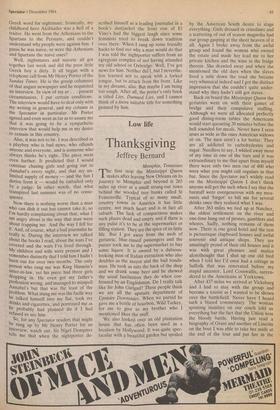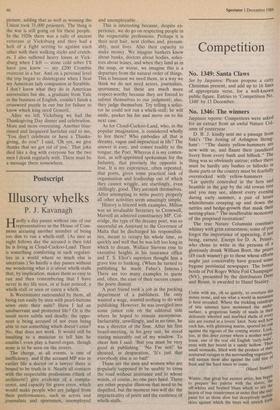Low life
Thanksgiving
Jeffrey Bernard
Memphis, Tennessee The first stop the Mississippi Queen makes after leaving New Orleans on its journey to Memphis and beyond is 265 miles up river at a small strung-out town behind the wooded tree banks called St Francisville. Typical of so many small, country towns in America it has little centre, not much heart and is in fact all suburb. The lack of compactness makes such places dead and empty and if there is any pulse it's to be at the supermarket or filling station. They are the spice of its little life. But I got away from the mob of geriatric, blue-rinsed passengers and the purser took me to the supermarket to buy some liquor. It is owned by a dubious- looking man of Italian extraction who also doubles as the mayor and the bail bonds- man. He took us into the back of the shop and we drank some beer and he showed the usual fascination they do when con- fronted by an Englishman. Do I really talk like Sir John Gielgud? These people think we are all the upstairs department of Upstairs Downstairs. When we parted he gave me a bottle of bourbon, Wild Turkey, for me to give to my brother who I mentioned likes the stuff.
We also looked over an old plantation house that has often been used as a location by Hollywood. It was quite spec- tacular with a beautiful garden but spoiled
by the American South desire to stage everything. Girls dressed in crinolines and a scattering of out of season magnolia had our group gasping at the sheer heaven of it all. Again I broke away from the awful group and found the woman who owned the estate and made her lead me to her private kitchen and the wine in the fridge therein. She drawled away and when she mentioned the old days when the slaves lived a mile down the road she became very whimsical indeed and I got the distinct impression that she couldn't quite under- stand why they hadn't still got slaves.
Back on board the Mississippi Queen the geriatrics went on with their games of bridge and their compulsive stuffing. Although we were all allocated perfectly good dining-room tables the Americans would start queueing 20 minutes before the bell sounded for meals. Never have I seen arses as wide as the ones American widows sit on. The men aren't a lot better. They are all addicted to carbohydrates and sugar. Needless to say, I whiled away most of my time in one of the bars and it was extraordinary to me that apart from myself there were only two men out of 400 who were what you might call regulars in that bar. Since the Spectator isn't widely read on the Mississippi Queen I don't think anyone will get the sack when I say that the barstaff were overgenerous with my mea- sures and 'forgot' to bill me for several drinks once they realised what I was.
After 363 miles we tied up at Natchez, the oldest settlement on the river and one-time hang out of pirates, gamblers and whores. Sadly, nothing remains of them now. There is one good hotel and the rest is picturesque clapboard houses and awful souvenir and antique shops. They are amazingly proud of their old houses and it was with great pleasure and malice aforethought that I shut up one old bird when I told her I'd once had a cottage in Suffolk that was renovated before my stupid ancestor, Lord Cornwallis, surren- dered to the Americans at Yorktown.
After 437 miles we arrived at Vicksburg And I had to stay with the group and become a tourist as I wanted to be shown over the battlefield. Never have I heard such a biased commentary. The woman spouting inanities on our coach told us everything bar the fact that the Union won the bloody battle. Having just read a biography of Grant and another of Lincoln on the boat I was able to take her aside at the end of the tour and put her in the picture, adding that as well as winning the Union took 31.000 prisoners. The thing is the war is still going on for these people. In the 1920s there was a rally of ancient veterans at Vicksburg and they had a hell of a fight setting to against each other with their walking sticks and crutch- es. I also suffered heavy losses at Vick- sburg when I left — stone cold sober I'll have you know — my £200 Crombie overcoat in a bar. And on a personal level the trip began to disintegrate when I beat my American lady companion at Scrabble. I don't know what they do in American universities but she, a graduate from Yale in the business of English, couldn't finish a crossword puzzle in our bar for failure to know which king sired Goneril.
After we left Vicksburg we had the Thanksgiving Day dinner and celebration. More and more overeating. Another blue- rinsed and lacquered harridan said to me, `You don't celebrate or have a Thanks- giving, do you?' I said, 'Oh yes, we give thanks that we got rid of you.' That joke died like a dog with everyone bar the two men I drank regularly with. There must be a message there somewhere.























































 Previous page
Previous page